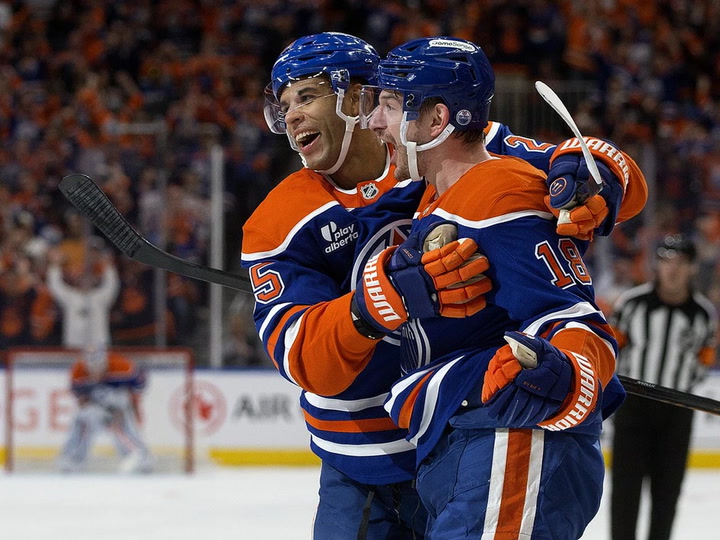The Edmonton Oilers successfully handled the Los Angeles Kings in the opening round of the Stanley Cup Playoffs, wrapping up the series in five games with a blend of offensive flair, strong goaltending, and occasional grit. But if they want to eliminate the Vegas Golden Knights—the reigning Stanley Cup champions—in the next round, they must elevate their game in specific areas. The Golden Knights are not the Kings; they’re deeper, more physical, and more experienced in grinding out playoff wins.
Here are nine things the Oilers must improve or adjust to get past Vegas and keep their championship hopes alive.
Against Los Angeles, the Oilers were buoyed by their stars—Connor McDavid and Leon Draisaitl delivered as expected—but the depth scoring still had its quiet nights. Ryan McLeod, Warren Foegele, and the bottom-six forwards need to produce more consistently. Vegas rolls four lines with ease, and if Edmonton gets hemmed into a top-heavy attack, they’ll wear down fast.
In particular, players like Adam Henrique and Corey Perry, brought in for playoff savvy, must chip in with goals or at least sustain pressure during their shifts. The Golden Knights can punish one-dimensional teams. Edmonton can’t afford to be one.
The Kings were methodical and at times predictable in transition, allowing the Oilers to neutralize their breakout game. Vegas, however, thrives on quick counters. With players like Jack Eichel, Jonathan Marchessault, and Chandler Stephenson, the Golden Knights can pounce off turnovers and turn them into instant goals.
Edmonton’s defense—especially the second pair—must improve at defending rushes. Evan Bouchard and Darnell Nurse had lapses against L.A. and will face tougher tests. Avoiding high-risk pinches and keeping tight gaps through the neutral zone are critical to limiting Vegas’s fast-strike potential.
Stuart Skinner was solid in Round 1, but he wasn’t tested as often as he will be against Vegas. The Golden Knights create chaos in front of the net and capitalize on rebounds and second chances. Skinner needs to be sharper on high-danger chances and, perhaps more importantly, maintain mental composure if the Oilers get behind.
Vegas will apply pressure in waves. Skinner doesn’t need to steal games outright, but he has to be better than his counterpart—most likely Adin Hill—if Edmonton wants to advance.
The Oilers’ power play continued its dominance against the Kings, operating at nearly 50%. That’s unsustainable long-term, especially against a disciplined Vegas team. More concerning is that Edmonton occasionally relied on power-play goals to swing momentum rather than asserting control at 5-on-5.
While their man advantage remains lethal, the Oilers must generate more 5-on-5 offense and avoid chasing power plays to bail them out. Vegas is better at even strength than L.A., and the margin for error is thinner.
Vegas excels at faceoff efficiency, and they often use it to generate quick scoring chances. The Oilers struggled on defensive-zone draws at times against the Kings, allowing L.A. to reset their cycle or get clean shots from the point.
Winning critical faceoffs, especially late in periods or on the penalty kill, will be essential. Edmonton may need to deploy players like Derek Ryan or Leon Draisaitl in more key faceoff situations regardless of line matching.
Vegas might not have the most lethal power play in the league, but they’re opportunistic and have playoff-tested snipers. Edmonton’s tendency to take careless or retaliatory penalties reared its head more than once against the Kings. Those mistakes are magnified in tight series.
They’ll need to avoid stick infractions and emotional outbursts. Maintaining composure—especially against agitators like Nic Hague or Keegan Kolesar—is crucial. Discipline can be the difference between advancing or heading home.
The Golden Knights are one of the NHL’s most physical teams, and their forecheck punishes defensemen. Edmonton’s blue line—while mobile—isn’t the most rugged. The Kings forechecked, but not with the same brutality or intent as Vegas.
To survive a best-of-seven war with Vegas, the Oilers must move the puck quickly and avoid getting pinned in their zone. Otherwise, their defense will wear down. The coaching staff may even need to rotate in fresher legs or lean more on Vincent Desharnais or Brett Kulak if the series gets physically taxing.
Jay Woodcroft was often reactive rather than proactive with his line matching and in-game adjustments. In contrast, Bruce Cassidy is a master tactician, regularly tweaking his lines and defensive pairings based on opponent tendencies.
Woodcroft needs to anticipate Vegas’s adjustments and deploy his top players strategically—especially on the road. Using McDavid or Draisaitl in favorable matchups without overextending them will be a delicate balance. There’s no time for stubborn line combinations or hesitation behind the bench.
Vegas rarely gets blown out. Most of their games—especially in the playoffs—are won or lost by a goal or two. Edmonton showed poise in the L.A. series but hasn’t been pushed to the brink in tight, grind-it-out playoff contests yet this year.
They’ll need to prove they can stay composed in 2-2 third periods, survive long stretches without goals, and bounce back from tough bounces. Winning playoff hockey requires mental resilience, and that’s something Vegas has in abundance.
The Edmonton Oilers are a legitimate Stanley Cup contender, but their path to the Final runs through an experienced, gritty Vegas team that knows how to shut down high-octane offenses. To advance, Edmonton must become more than just McDavid and Draisaitl. They need to play smarter, tighter, and deeper.
Every flaw that went unpunished by the Kings could be exposed by the Golden Knights. The margin for error is razor thin. But if the Oilers can elevate in these nine areas, they have the talent and drive to finally vanquish Vegas—and keep their Cup dream alive.



